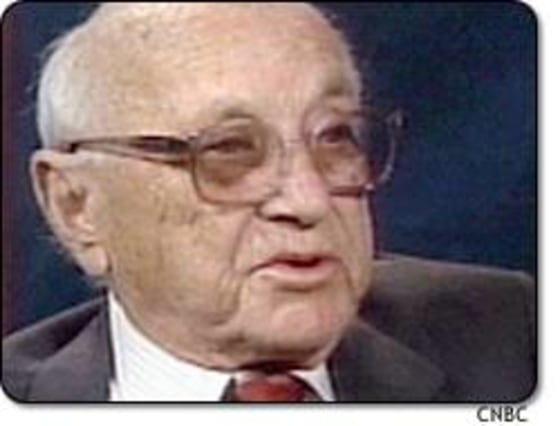Nobel prize-winning economist Milton Friedman is known as a passionate advocate of free markets; his theories center on the demand for money. And as CNBC found out in a recent interview, a lot of what seems new in today’s economy is really no surprise at all to Friedman.
Friedman was a founder of the so-called Chicago school of economics, which came to dominate political and economic discourse in the early 1980s. Still going strong at 91, he remains a faithful defender of the power of the free market and the resilience of this economy.
“We are in a process of speeding up of the economy,” he said. “We are heading to a period of very rapid growth. There’s been a lot of talk about deflation vs. inflation. Deflation is not a problem and will not be a problem. But we are likely to face the problem of inflation.”
Though he made his name as an opponent of Keynesian intervention, Friedman gives Alan Greenspan’s Fed high marks for its stewardship of the economy, giving the central bank an “A-minus.”
“If money growth continues at its present rate, we will probably have the problem of inflation again,” he said. “But I have confidence in the Fed recently. I never used to. They’ve done much better in the last twenty years than they did before. It’s reasonable to expect that they can slow things down in time to avoid any serious bout of inflation.”
Friedman is at his best in explaining away some popular interpretations and fears about today’s economy. For instance, dismissing the Cassandras who see economic danger in the rise in productivity.
“Productivity has gone up the last 200 years,” he said. “That’s why we have as high an income that we do.”
And rebutting the notion that something has changed.
“I don’t believe that there is anything new in the economy at all,” he said. “You know, we had the same talk in the 1920s. There was a tremendous surge in productivity, very much like the 90s during that ten-year period. ... This time, the big difference is the way the Fed has handled the monetary reaction. And as a result, we had a mild recession and nothing to cut down productivity sharply.”
Friedman said the effect of Moore’s law shouldn’t be overstated. That’s a popular theory that the speed of microprocessors will double and the price fall by half every 18 months, contributing to lower prices in the rest of the economy.
“Moore’s law has made computers cheaper,” he said. “It has made your Blackberry cheaper. It has not made food cheaper. It has not made a visit to the doctor cheaper. It has not made automobiles cheaper. You mustn’t carry it too far.”
Friedman explained that advances in technology initially take up a greater part of spending as they are adopted. But eventually, as an industry gets more efficient, it takes up a smaller percentage of the economy, and has less of an effect on pricing in the rest of the economy.
It’s happened with farming, with transportation and will, Friedman says, with technology.
“This area of the economy, does it get bigger or does it get smaller? You have more pieces of goods, but each one is worth less. So is it clear that the total volume or value necessarily increases? Not necessarily. Does the fraction of income spent on such items go up? No. It has, of course, but it isn’t going to indefinitely. It’s very different from medicine in this respect.”
If technology pricing behaves according to free-market principles, clearly, medical prices do not. And that seems to bother Friedman.
“It used to be when you went to the doctor, the first thing they asked you is, ‘what’s wrong with you?,’” he said. “Nowadays, the first thing they ask is, ‘what’s your insurance?’ That’s not a good change.”
Friedman is a believer in letting the free market do its work. And he doesn’t think the free market works for health care. The problem is that individuals are the consumers of health care — but it is companies or the government that foots the bill. And that, says Friedman, just doesn’t make sense.
“In my ideal world, companies would not be in the business of health care,” he said. “Why not get your food from your company? Why should your company provide health care but not food? Do you want to be with the company store — to get your wages in kind? You don’t buy your car from your company.”
According to Friedman, this system has evolved as a result of tax policy, not health care policy.
“The reason companies offer health care is because of the tax exemption,” he said. “Employees can get more health care from their employer than if they have to buy it. That’s a mistake. You pay more of the rest of your income in taxes.”
The result, says Friedman, is that the cost of medical care is skyrocketing.
“We spend a larger percentage of our income on medical care than any other nation in the world,” he said. “It’s four times as much as a percentage of income as during World War II.”
So what’s the solution?
“My ideal remedy would be for the individual, as it used to be, pay for his own medical care,” he said.
Friedman thinks that people should pay for their own everyday health care needs and have catastrophic insurance for emergencies. He thinks people make better decisions when they are spending their own money.
As for when the time is ripe for reform, Friedman thinks “time is always ripe for change. Better arrangements are better than worse arrangements.”
